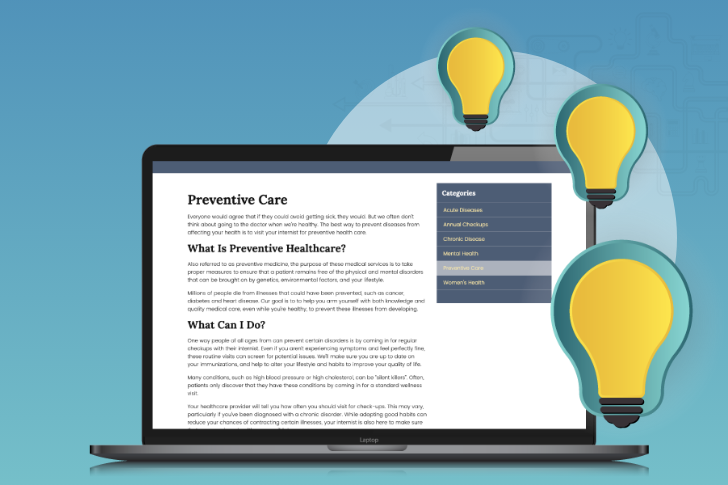 Your bio is an important part of your website. It is a reflection of who you are as the physician, and it provides your patients a quick, detailed account of your background and qualifications. It’s no surprise that it can be an intimidating task to prioritize your entire professional life in just a few paragraphs.
Your bio is an important part of your website. It is a reflection of who you are as the physician, and it provides your patients a quick, detailed account of your background and qualifications. It’s no surprise that it can be an intimidating task to prioritize your entire professional life in just a few paragraphs.
Month: March 2012
 Your reputation is solid, and your medical services speak for themselves. But for some reason, you can’t get a foothold on the Web. Patients visiting your website don’t stick around long enough to connect with you. At worst, they take one look and head back to Google for other options. Maintaining a strong website takes some work. If you overlook certain details, your site will fail.
Your reputation is solid, and your medical services speak for themselves. But for some reason, you can’t get a foothold on the Web. Patients visiting your website don’t stick around long enough to connect with you. At worst, they take one look and head back to Google for other options. Maintaining a strong website takes some work. If you overlook certain details, your site will fail.
Here are four potential reasons people are turning away from your website.
1. Your site is painful to look at.
A successful website is easy on the eyes. We’ve all seen sites that make us cringe, so we know how important it is to enlist a Web designer who knows how to create a site that doesn’t scare away visitors; one that is designed for a medical professional, and one that makes a good first impression with new and referred patients.
Your readers are looking at your content, too. Site visitors notice poor grammar, and they take no comfort in a professional site that lets typos slide. Have a writer or editor double-check every word before you post content.
2. It’s outdated.
Website visitors are turned off by clearly outdated or incomplete websites. Placeholder pages that simply say, “Site Under Construction” or “Information Coming Soon” are clear indicators that this particular website will not be a useful resource. Your website should be continuously updated with information related to staff and services. A company blog, for example, can demonstrate that the site stays up to date on a regular basis.
If patients can’t find the information they’re looking for because of an outdated website, they’ll move on to a site that is better maintained.
3. Navigation is difficult.
Your website’s main goal is to create new patient leads by providing visitors with the information they need right away. Impatient visitors who can’t find what they’re looking for will quickly move on to another site. With that in mind, make sure your site includes the most relevant information upfront. Don’t bog down your homepage with endless text, but make sure visitors know what you do and how they can contact you.
For example, a visiting patient could be looking for a way to request an appointment online, or maybe he’s looking for specific patient forms. The patient might seek quick access to your Facebook page, blog posts or patient testimonials without having to descend into a maze of links. Hours of operation, address and maps should be easy to find, as well.
Be succinct when you can. Separate pages – such as a staff page, an office page, a page for new patients and a services page – can include more detailed information. In those cases, use short paragraphs, and break up text with graphics and photos.
4. It lacks patient education.
A successful medical practice website will offer information for new patients, existing patients and patients who have left your care. For example, a site could include an extensive library of educational dental animations, videos or illustrations to inform patients. The services you provide should be listed, explained and accompanied by links to relevant resources.
Your site should have information for patients who are preparing for procedures (when to fast in advance of surgery, for example, or what to expect during a procedure). Patients who leave your care should have the ability to visit your site for additional information pertaining to recovery. Additional information can be invaluable to your patients, increasing treatment awareness as they make decisions crucial to their health, and making them more compliant with procedures.
If you’d like to hear more tips, contact Officite today. We specialize in coherent and functional designs for medical websites.
Online marketing is playing a more and more important role in medical practices and is a great way to generate new and referred patients. The problem is that too frequently once a website is launched or an Internet marketing program is started, it is left by the wayside—untouched, underperforming and ineffective. Don’t allow a few wrong turns in the process of building your Web presence hinder its success. Here are 3 common Internet marketing mistakes practices should avoid:
Mistake # 1: Choosing the wrong website provider
You may think anyone can build you a website, and while there’s some truth to that, the finished product may not be the website that is right for your practice. Make sure you do your homework before teaming with a website provider. Do they have knowledge of the medical industry? How many practices have they worked with? Do they offer additional online marketing services or only websites? All of these questions should be considered before deciding on a company to take the reigns of your Web presence.
Choose a company who understands medical marketing trends; who has a proven track record of designing, developing and launching professional, attractive and effective websites for healthcare practices; and who can walk you through each step of building your Web presence from website launch and management to search marketing and social media.
Mistake #2: Cutting corners on initial website design
Settling for a second-rate site just to save a few bucks is never the right decision. Since your website is often times the first impression a new patient has of your practice, you don’t want your poorly designed home page to send the message: ‘We’re not up to speed.’ Today, it’s possible to build a website that is tailored to your specific practice marketing needs and budget, and when built correctly, you can easily get an ROI that surpasses the amount of money you put into building your site in less than a year.
Mistake # 3 Failure to adopt new strategies
The world of online marketing is constantly changing. The search engines are always updating their algorithms, new online communication channels are emerging, technology is shifting, and what’s prevalent today may be outdated tomorrow. Just as you can’t have a car without an engine, you can’t build a website and expect it to attract new patients without an online marketing strategy to support it. Search engine marketing, social networking, reputation management, blogging and web-based patient education are all important and highly effective ways to attract and retain patients online.
The success of your practice website and online marketing strategy boils down to two things: your choice of a website and online marketing provider and how committed you are to keeping your Web presence in-tune with the latest Internet marketing trends. With a better grasp of managing your Web presence and an experienced website provider leading the way, you can expect a steady flow of new patients to your practice who found you on the Internet.



